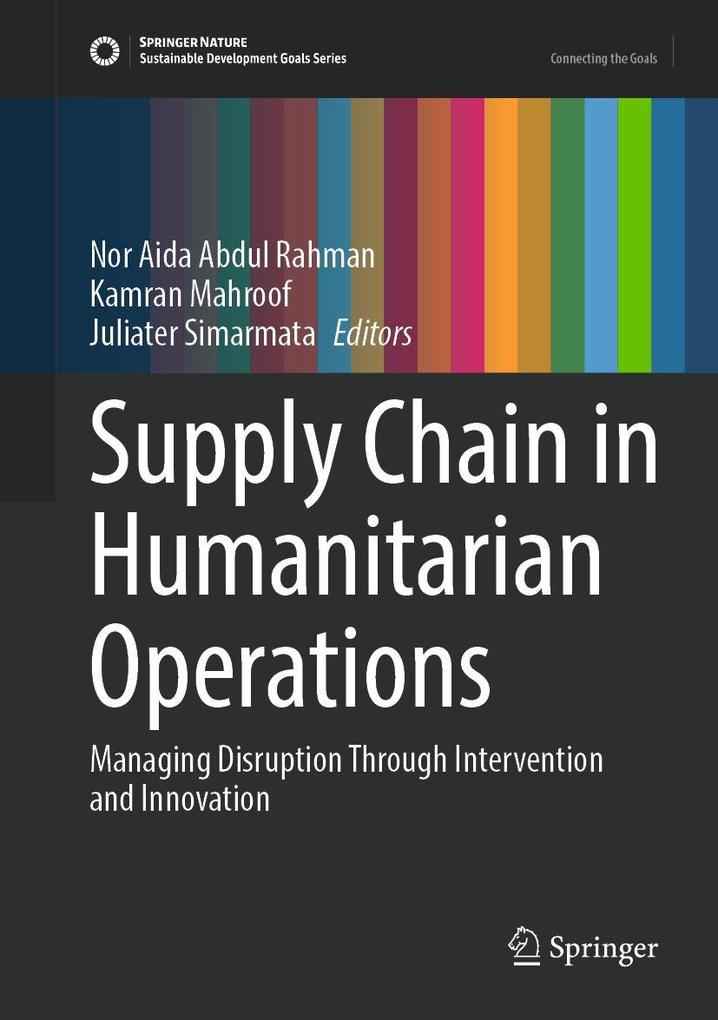
Zustellung: Di, 08.09. - Fr, 11.09.26
Noch nicht erschienen
VersandkostenfreiBestellen & in Filiale abholen:
This book explores the pivotal role of humanitarian logistics and supply chain management in ensuring effective response and relief efforts during crises. It delves into the technology revolution in this field, covering emerging trends and providing in-depth knowledge on theories and applications. The book emphasizes how technology can enhance the efficiency of humanitarian logistics and supply chain operations, integrating and optimizing technology for effective aid delivery during emergencies or crises.
This book highlights the vital role that humanitarian logistics and supply chain management play during crises, emphasizing recent technological advancements. It explores the key components, challenges, and innovations that enhance the effectiveness of these systems in providing timely and targeted assistance. The book also connects humanitarian logistics to several Sustainable Development Goals (SDGs), demonstrating how these efforts contribute to poverty alleviation, health, and disaster resilience. This book offers a blend of comprehensive research and high-quality outputs from reputed authors and editors. It targets doctoral, postgraduate, graduate, and final-year undergraduate students in aviation, logistics, transport, travel, and tourism studies, as well as managers and decision-makers worldwide.
Inhaltsverzeichnis
Chapter 1:Research on Humanitarian Logistics and Supply Chain. - Chapter 2: Optimizing Humanitarian Logistics: A Framework for Rapid Response to Supply Chain Disruptions in Crisis Situations. - Chapter 3: A thematic review on critical success factor in Humanitarian Logistics. - PART II: Technology Trends in Humanitarian Logistics. - Chapter 4: Innovation Adoption in Humanitarian Logistics: A Framework for Evaluating the Implementation of Cutting-Edge Technologies in Relief Operations. - Chapter 5:From Crisis to Resilience: Advancing Humanitarian Logistics Through the Lens of Emerging Technologies. - Chapter 6: Integration of Technology and Aeromedical Services in Humanitarian Operations: A Case Study Approach. - Chapter 7: Empowering Humanitarian Endeavours: Exploring Technological Innovations for Enhanced Food Safety and Security in Aid Operations" . - Chapter 8: An Integrated Approach to Technology-Enabled Coordination in Humanitarian Supply Chains: A Resilience Framework" . - Chapter 9: The emerging role of technology in mitigating risk in humanitarian supply chain. - Chapter 10: Using AI to assist humanitarian efforts: Possibilities and hazards. - Chapter 11: How block chain technology manages supply chain risks. - Chapter 12:Biometric technology in Humanitarian Sector. - Part III: Future Directions. - Chapter 13: Regulations and Procedure in Humanitarian Logistics and Supply Chain: Post Pandemic Era. - Chapter 14: Humanitarian logistics and lesson learnt from Covid-19. - Chapter 15: Humanitarian Logistics 4. 0: Future Research Agenda.
Produktdetails
Erscheinungsdatum
21. Juni 2025
Sprache
englisch
Seitenanzahl
171
Reihe
Sustainable Development Goals Series
Herausgegeben von
Nor Aida Abdul Rahman, Kamran Mahroof, Juliater Simarmata
Verlag/Hersteller
Produktart
gebunden
Abbildungen
XIX, 169 p. 29 illus., 22 illus. in color.
ISBN
9789819644254
Entdecken Sie mehr
Bewertungen
0 Bewertungen
Es wurden noch keine Bewertungen abgegeben. Schreiben Sie die erste Bewertung zu "Supply Chain in Humanitarian Operations" und helfen Sie damit anderen bei der Kaufentscheidung.









